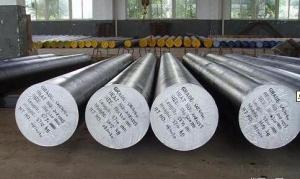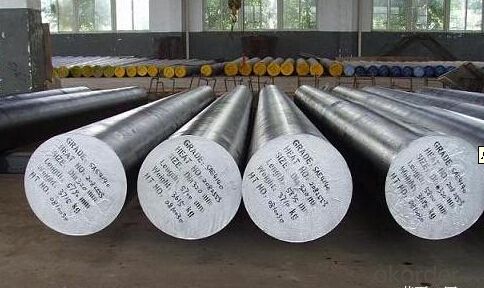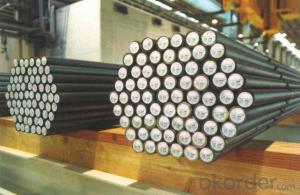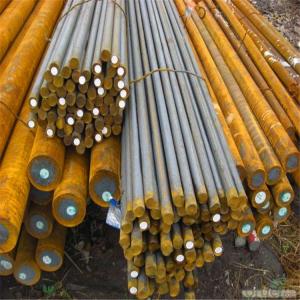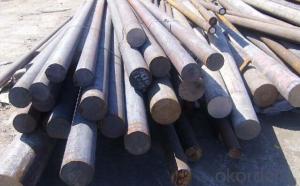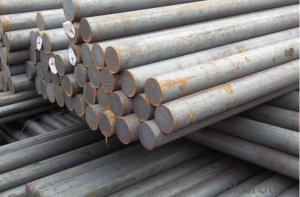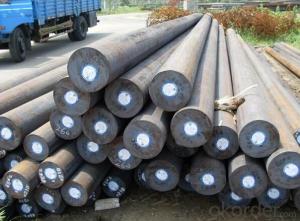Grade 34CrNiMo6/DIN1.6582/ AISI4340 Steel Round Bar
- Loading Port:
- Shanghai
- Payment Terms:
- TT OR LC
- Min Order Qty:
- 3 m.t.
- Supply Capability:
- 100000 m.t./month
OKorder Service Pledge
OKorder Financial Service
You Might Also Like
Specification
Grade 34CrNiMo6/DIN1.6582/ AISI4340 Steel Round Bar
Details Information of Grade 34CrNiMo6/DIN1.6582/ AISI4340 Steel Round Bar
| Name | Grade 34CrNiMo6/DIN1.6582/ AISI4340 Steel Round Bar |
| Shape | Round Bar/Square Bar/Flat Bar/Plate/Wire |
| Standard | GB/ASTM/SAE/AISI/DIN/JIS/EN/BS |
| Surface Treatment: | Black/Peeling/Polished/Machined |
| Delivery Condition: | Hot Rolled or Forged/Peeled or Black Surface |
| Test | SGS/UT 100% Elements Testing |
| Certificate: | ISO/Mill Certificate |
| Service: | 24 hours online service / |
| more than 20 years trading and manufacture | |
| Quality Assurance: | the third party inspection, such as SGS, BV, TUV…etc. is acceptable |
| Packaging Details: | Seaworthy Packaging or as per customer's packing instruction |
| Carbon structure round bar | Q195 Q235A Q235B 10# 20#-55# S45CB |
| Low alloy high strength round bar | Q345A/Q345C/Q345D Q345B Q345E |
| Alloy structure round bar | SAE51B20 20Cr 40Cr 40CrV 20CrMo/30CrMo/35CrMo/42CrMo 20CrMoA/30CrMoA/35CrMoA/42CrMoA/42Cr ML20CrMo/ML30CrMo/ML35CrMo/ML42CrMo B7/SCM435-440 20MnTiB 20CrMnMo 20CrMoH 42CrMoH 40MnB/40MnBH 30Mn2-40Mn2 27SiMn 50CrVA 30CrMnTi |
| Pinion steel | 20CrMnTi 20CrMnTiH 20CrMnTiHCS/20CrMnTiHLD Q20CrMnTi-1/Q20CrMnTi-2 |
| Sucker rod | 20-35CrMoA |
| Free-cutting steel | GT1215S |
| Spring steel | 60Si2MnA 65Mn |
| Ball bearing steel | GCr15 |
Chemical Composition of Grade 34CrNiMo6/DIN1.6582/ AISI4340 Steel Round Bar
| C | Si | Mn | P | S | Cr | Ni | Cu |
| 0.17-0.24 | 0.17-0.37 | 0.35-0.65 | ≤0.035 | ≤0.035 | ≤0.25 | ≤0.25 | ≤0.25 |
| Tensile strength (σb/MPa) | Yield strength (σb/MPa) | Elongation (δ5/%) |
| ≥410(42) | ≥245(25) | ≥25 |
Company Introduction of Grade 34CrNiMo6/DIN1.6582/ AISI4340 Steel Round Bar
CNBM International Corporation is the most import and export platform of CNBM group(China National Building Material Group Corporation) ,which is a state-owned enterprise, ranked in 270th of Fortune Global 500 in 2015.
With its advantages, CNBM International are mainly concentrate on Cement, Glass, Iron and Steel, Ceramics industries and devotes herself for supplying high quality series of refractories as well as technical consultancies and logistics solution.
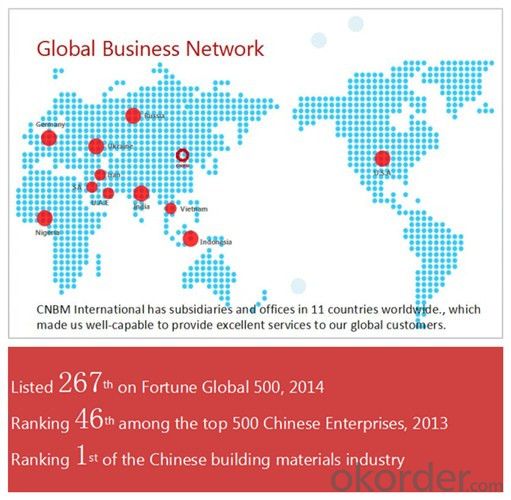
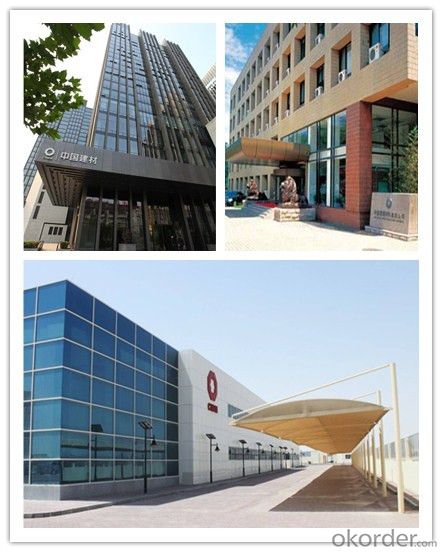
Certificates of Grade 34CrNiMo6/DIN1.6582/ AISI4340 Steel Round Bar
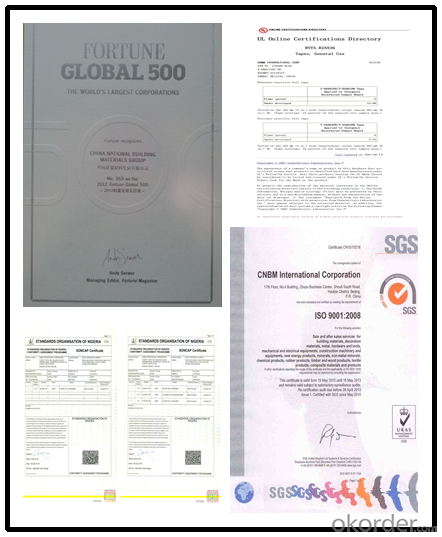
Packaging & Delivery of Grade 34CrNiMo6/DIN1.6582/ AISI4340 Steel Round Bar
Packaging Detail | Sea worthy packing /as per customer's packing instruction |
Delivery Detail | 15 ~ 40 days after receiving the deposit |
Products show of Grade 34CrNiMo6/DIN1.6582/ AISI4340 Steel Round Bar
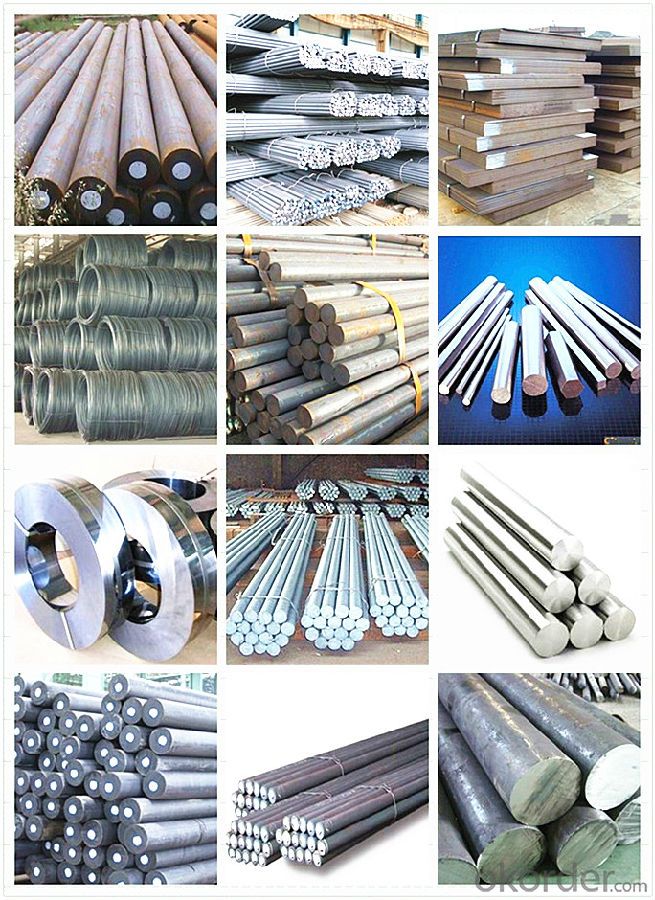
FAQ
Are you a trading company or manufacturer? | Manufacturer |
What’s the MOQ? | 3 metric ton |
What’s your delivery time? | 15-35 days after downpayment received |
Do you Accept OEM service? | Yes |
what’s your delivery terms? | FOB/CFR/CIF |
What's the Payment Terms? | 30% as deposit,70% before shipment by T/T |
Western Union acceptable for small amount. | |
L/C acceptable for large amount. | |
Scrow ,Paybal,Alipay are also ok | |
Why choose us? | Chose happens because of quality, then price, We can give you both. Additionally, we can also offer professional products inquiry, products knowledge train (for agents), smooth goods delivery, excellent customer solution proposals. |
What's your available port of Shipment? | Main Port, China |
What’s your featured services? | Our service formula: good quality+ good price+ good service=customer's trust
|
Where are your Market? | Covering more than 160 countries in the world |
- Q: What are the different techniques used for joining special steel?
- There are several techniques used for joining special steel, including welding, brazing, soldering, and adhesive bonding. Welding is the most common method, which involves melting the base material and adding a filler material to create a strong bond. Brazing uses a filler metal with a lower melting point than the base material, while soldering uses a lower melting point filler metal. Adhesive bonding involves using a special adhesive to bond the steel parts together. Each technique has its advantages and limitations, and the choice depends on the specific requirements of the application.
- Q: How does special steel perform in cryogenic impact resistance?
- Special steel is known for its exceptional performance in cryogenic impact resistance. When exposed to extremely low temperatures, such as those experienced in cryogenic environments, special steel maintains its structural integrity and remains highly resistant to impact and fractures. This is due to the unique composition and processing techniques employed in the manufacturing of special steel. Special steel contains specific alloying elements that enhance its low-temperature properties. These alloys help prevent the formation of brittle phases within the steel structure, which are susceptible to cracking under impact. Additionally, the manufacturing process for special steel involves precise control of cooling rates, which further enhances its resistance to cryogenic impact. The exceptional cryogenic impact resistance of special steel makes it an ideal material for applications that involve low-temperature environments, such as in the construction of liquefied natural gas (LNG) storage tanks, cryogenic pipelines, and aerospace components. In these applications, special steel ensures the safe and reliable operation of equipment, even under extreme conditions. Moreover, special steel's high strength and toughness at low temperatures allow it to withstand dynamic loads and absorb energy without failure. This property is particularly important in scenarios where impact loads are present, such as in offshore structures subjected to harsh marine environments or in cryogenic storage facilities subjected to seismic events. In conclusion, special steel demonstrates excellent performance in cryogenic impact resistance. Its unique composition and manufacturing process enable it to maintain its structural integrity, resist fractures, and absorb impact loads even at extremely low temperatures. This makes special steel a highly reliable and sought-after material for a wide range of applications in cryogenic environments.
- Q: How does special steel contribute to the telecommunications industry?
- Special steel plays a crucial role in the telecommunications industry by providing the necessary strength, durability, and resistance to various environmental factors. In telecommunications, special steel is primarily used in the manufacturing of transmission towers, antenna systems, and other supporting structures. Transmission towers, for instance, are the backbone of the telecommunications network. They need to be able to withstand extreme weather conditions like strong winds, heavy precipitation, and even earthquakes. Special steel, with its high tensile strength and resistance to corrosion, ensures that these towers remain stable and operational under such challenging circumstances. Furthermore, special steel is also used in the construction of antenna systems. Antennas, whether for satellite communication or wireless networks, require materials that possess excellent electrical conductivity and low signal loss. Special steel alloys can meet these requirements, allowing for efficient signal transmission and reception. Moreover, special steel offers the advantage of being lightweight compared to other materials while maintaining its strength. This weight reduction is particularly beneficial when it comes to constructing structures that need to be installed at significant heights, such as telecommunication towers. By using special steel, telecommunications companies can achieve cost savings in both construction and transportation. Additionally, special steel's durability and resistance to corrosion make it ideal for long-term use in the telecommunications industry. These properties ensure that the structures and equipment made from special steel have an extended lifespan, reducing maintenance and replacement costs. This longevity also contributes to the overall reliability and stability of the telecommunications network. In summary, special steel's unique properties, including its strength, durability, resistance to environmental factors, and efficient signal transmission capabilities, make it an essential material in the telecommunications industry. By providing the necessary support and reliability, special steel contributes significantly to the seamless operation of communication networks, enabling efficient and reliable connectivity for individuals and businesses worldwide.
- Q: What are the challenges in casting special steel?
- Some of the challenges in casting special steel include achieving the desired chemical composition and metallurgical properties, ensuring proper fluidity and mold filling, controlling shrinkage and porosity, dealing with high melting temperatures, and managing the presence of alloying elements and impurities. Additionally, the complex and intricate designs of special steel components can pose challenges in achieving accurate and defect-free casting.
- Q: What are the different types of welding techniques used for special steel?
- There are several types of welding techniques used for special steel, including TIG (Tungsten Inert Gas) welding, MIG (Metal Inert Gas) welding, Stick welding, and Flux-cored arc welding. These techniques are commonly used for welding special steel due to their ability to provide strong and precise welds, ensuring the integrity and durability of the material.
- Q: How is wear-resistant tool steel used in the production of cutting tools?
- Wear-resistant tool steel is used in the production of cutting tools due to its exceptional hardness and resistance to wear and abrasion. This steel is specifically designed to maintain its sharpness and durability even when subjected to high temperatures and intense cutting forces. By using wear-resistant tool steel, cutting tools can effectively cut through various materials without losing their edge, resulting in improved efficiency and longer tool life.
- Q: Can special steel be used in the production of springs for watches?
- Yes, special steel can be used in the production of springs for watches. Special steel, such as stainless steel or high carbon steel, is often preferred for watch springs due to its excellent strength, durability, and resistance to corrosion, ensuring reliable and long-lasting performance of the watch.
- Q: How does special steel contribute to the energy sector?
- Special steel plays a critical role in the energy sector, contributing significantly to its efficiency, reliability, and safety. Firstly, special steel is used in the construction of pipelines and storage tanks, which are crucial components of the oil and gas industry. These pipelines need to withstand high pressures, extreme temperatures, and corrosive environments, and special steel provides the necessary strength and resistance to ensure their integrity and prevent leakage. In addition, special steel is utilized in the manufacturing of turbine blades and other components in power generation plants. These plants require materials that can withstand the high temperatures and pressures generated by the combustion of fossil fuels or the use of nuclear energy. Special steel's heat-resistant properties make it ideal for these applications, improving the overall efficiency and longevity of power plants. Furthermore, special steel is used in the production of wind turbines, which are rapidly becoming an essential source of renewable energy. The blades, tower structures, and gearboxes of wind turbines are subjected to significant stress and strain, and special steel provides the necessary strength and durability to withstand these conditions. By using special steel, wind turbines can operate reliably and efficiently, contributing to the growth of clean energy. Moreover, the energy sector relies on special steel for its infrastructure, such as transmission towers and substations. These structures need to support heavy loads and withstand extreme weather conditions while maintaining electrical conductivity. Special steel's high strength and corrosion resistance make it a suitable material for these applications, ensuring the reliable transmission and distribution of electricity. Overall, special steel plays a crucial role in the energy sector by providing the necessary strength, durability, and resistance to extreme conditions. Its use in pipelines, power generation plants, wind turbines, and infrastructure improves the efficiency, reliability, and safety of the energy sector, facilitating the production and distribution of both conventional and renewable energy sources.
- Q: How is special steel tested for quality and performance?
- Special steel is tested for quality and performance through a series of rigorous assessments that include non-destructive testing methods such as ultrasonic testing, magnetic particle inspection, and dye penetrant inspection. These tests help identify any defects or irregularities in the steel's structure or composition, ensuring its durability, strength, and overall performance meet the required standards. Additionally, mechanical tests like hardness testing and tensile testing are conducted to evaluate the steel's physical properties, while chemical analysis is performed to verify its chemical composition. All these meticulous testing procedures ensure that special steel meets the necessary quality and performance criteria.
- Q: Can special steel be used for making nuclear industry components?
- Indeed, special steel, also known as alloy steel, possesses the necessary properties to be utilized in the creation of components for the nuclear industry. These properties encompass high strength, excellent corrosion resistance, as well as good resistance to high temperatures and radiation. Components within the nuclear industry, such as reactor pressure vessels, steam generators, and fuel rods, endure extreme conditions characterized by high pressure, high temperature, and exposure to radiation. Special steel is capable of withstanding these conditions, maintaining its structural integrity, and ultimately guaranteeing the secure and dependable operation of nuclear facilities. The utilization of special steel within the nuclear industry also serves to prevent the release of radioactive materials. The exceptional corrosion resistance of special steel diminishes the likelihood of leakage and contamination, thereby augmenting the safety of nuclear power plants. Moreover, special steel can be customized to fulfill the specific requirements of the nuclear industry. Diverse types of special steel alloys can be developed by employing specific compositions and heat treatments, optimizing their properties for nuclear applications. This facilitates the customization of steel components to meet the distinct demands of the nuclear industry. In conclusion, special steel can undoubtedly be employed in the production of nuclear industry components due to its high strength, corrosion resistance, and resistance to high temperatures and radiation. Its utilization contributes to the safety and reliability of nuclear facilities, while simultaneously allowing for customization to fulfill specific requirements.
Send your message to us
Grade 34CrNiMo6/DIN1.6582/ AISI4340 Steel Round Bar
- Loading Port:
- Shanghai
- Payment Terms:
- TT OR LC
- Min Order Qty:
- 3 m.t.
- Supply Capability:
- 100000 m.t./month
OKorder Service Pledge
OKorder Financial Service
Similar products
Hot products
Hot Searches
Related keywords
